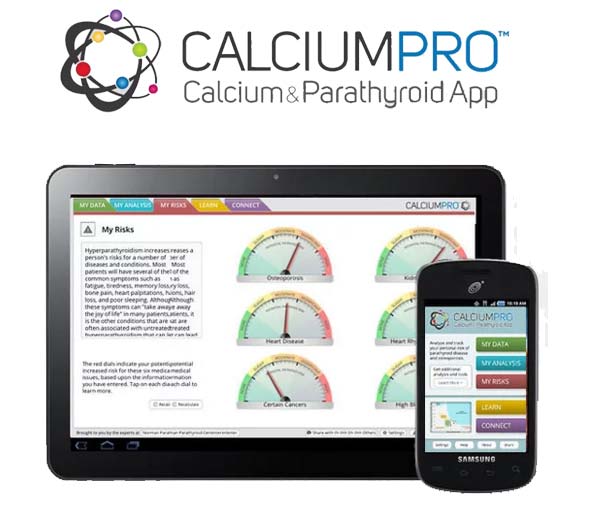The Top 5 Signs of Hyperparathyroidism

Health care providers often attribute the very common signs of hyperparathyroidism to natural aging and other health issues, such as obesity and poor diet. Consequently, the diagnosis of hyperparathyroidism is often delayed several years. This delay in recognizing the signs of hyperparathyroidism causes the continued destruction of body tissues such as kidneys, blood vessels, and bones. Thus, hyperparathyroidism is often diagnosed only after the development of substantial damage to bones and other organs. Although the signs of hyperparathyroidism are reversible after surgical cure, prompt recognition and treatment are ideal.
The Top 5 Signs of Hyperparathyroidism:
-
Bone loss, bone destruction, and osteoporosis
-
Kidney stones
-
High blood pressure
-
Stomach inflammation / GERD
-
Calcium buildup in blood vessels
Sign of Hyperparathyroidism #1: Bone Loss
Bone loss is an important sign of hyperparathyroidism that is often ascribed to menopause, poor diet, medications, family genetics, and an inactive lifestyle. Our bones are continuously breaking down and building up at a microscopic level, a dynamic that allows healthy bones to heal and regenerate.
However, hyperparathyroidism tips the balance between bone breakdown and buildup. This imbalance results in fragile bones that are prone to fractures from even mild stress, such as coughing or standing up.
Watch the entire video on hyperparathyroidism here.
Osteoporosis is a term that describes the loss of calcium from bones resulting in bones that are thin. Since parathyroid hormone (PTH) removes calcium from bones (that is what it does), all patients with a parathyroid problem will eventually develop thin bones. Bones with osteoporosis due to parathyroid problems can ache and hurt because the PTH is actively destroying the bone. Bones with osteoporosis are fragile bones which are much more susceptible to fractures and breaks.
The osteoporosis associated with parathyroid disease is often extreme. The most extreme (worst) osteoporosis is seen in patients with untreated hyperparathyroidism.
About 70% of all patients with parathyroid disease will already have osteoporosis when their doctor finally figures out they have hyperparathyroidism. Thus, ALL patients with hyperparathyroidism should have a DEXA scan as soon as the diagnosis of hyperparathyroidism is made.
There is NO MEDICINE that can stop the worsening of osteoporosis due to parathyroid disease. It will continue to get worse even if you take Fosamax, Actonel, Evista, Boniva, Reclast (etc)... The bones will not stay the same, they will continue to lose calcium and the osteoporosis will get worse. Period.
Once the parathyroid tumor is removed, the vast majority of patients will have a significant (and often dramatic) increase in bone density. Bone and joint pain is usually gone within 6 to 12 hours after the parathyroid tumor is removed. Osteoporosis associated with hyperparathyroidism is the ONLY type of osteoporosis that is completely reversible!
Sign of Hyperparathyroidism #2: Kidney Stones
Hyperparathyroidism is the number one cause of kidney stones. Every person with a kidney stone should be tested for a problem with their parathyroid glands. Nearly half of all people with kidney stones have a parathyroid tumor in their neck that must be removed or the kidney stones will return.
Although kidney stones are a leading sign of hyperparathyroidism, they are often attributed to dehydration and dietary issues. Most doctors do not do the correct testing of parathyroid glands in patients with kidney stones.
Kidney stones are composed of calcium. People suffering from hyperparathyroidism often have very high concentrations of calcium in their urine. This high calcium concentration drives the formation of kidney stones.
If you are reading this page because you recently had a kidney stone, you MUST be checked for a parathyroid problem. Untreated hyperparathyroidism doesn't just cause kidney stones, it also causes high blood pressure, osteoporosis, fractures, coronary heart disease, atrial fibrillation (heart problems), stroke, renal failure, GERD, and even increases your risk of several cancers. Avoiding more kidney stones is only one small part of why you must be checked for hyperparathyroidism.
Do not assume that your doctor is automatically checking you for a parathyroid problem. Less than 20% of doctors (including urologists) check patients for parathyroid problems when they get a kidney stone.
Kidney stones occur in about 4% of people, but are much more common in people with blood calcium levels over 10.0 mg/dl (the upper limit of normal for adults over age 35). It is VERY important to understand that the chances of getting kidney stones are NOT higher if your blood calcium goes higher. Said differently, a calcium of 12 does not give you higher chances of getting kidney stones than a calcium of 11.
Fortunately, people with hyperparathyroidism immediately stop forming new kidney stones after curative surgery.
For more information see our page on Kidney Stones in Hyperparathyroidism.
Sign of Hyperparathyroidism #3: High Blood Pressure
High blood pressure is a common condition, which is why it is often overlooked as a sign of hyperparathyroidism. The increased force of blood against vessel walls causes serious damage to the heart, kidneys, and other organs. As many as 75% of patients with parathyroid disease will have high blood pressure (hypertension). Sometimes it is hard to control and the patient has been put on 2, 3, and sometimes 4 drugs in an attempt to control it.
So, if you have hypertension, after your parathyroid tumor is removed, you and your doctor can expect to decrease the medications that you are on, and possibly even get rid of one or more of them! If you are on Atenolol, Lisinopril, Toprol, Enalapril, or another high blood pressure medication and your calcium is high... then you have this disease and need your tumor removed.
People with hyperparathyroidism achieve lower blood pressure after surgery, and they can usually reduce the dosage or the number of blood pressure medications they require. This improvement in blood pressure translates into improvements in heart health and longevity. Usually the resolution or decrease in severity of blood pressure occurs gradually during the first 2 weeks to 2 months following successful parathyroid surgery.
Sign of Hyperparathyroidism #4: Stomach Inflammation / GERD
Stomach inflammation is common sign of hyperparathyroidism. Health care providers often focus on drugs to diminish the symptoms of stomach inflammation, rather than investigate for a root cause. People suffering from hyperparathyroidism have high stomach acid production and defective mechanisms to prevent acidic reflux.
Patients cured of hyperparathyroidism report resolution or improvements in stomach discomfort and heartburn. After surgery, many can stop taking medications for stomach inflammation and reflux.
GERD (Gastro-Esophageal-Reflux Disease) occurs in 65% of patients with primary hyperparathyroidism and high calcium. Removing the parathyroid tumor cures the GERD in the majority of patients.
Several doctors at the Norman Parathyroid Center conducted a study with several thousand patients with primary hyperparathyroidism and GERD to measure scientifically what happens to their GERD after the parathyroid tumor was removed and their hyperparathyroidism was cured. Almost 60% of the 3,000 patients treated for primary hyperparathyroidism had GERD symptoms and 81% of them were taking prescription reflux medications every day for two or more years prior to enrolling in the study.
Findings: GERD symptoms were much improved or completely resolved for 62% of patients one year after they were cured by parathyroid surgery. This dramatic improvement in GERD symptoms can be seen in the dramatic decrease in GERD medications. Prescription medications for GERD decreased from 81% of the patients in the study down to 26% one year after removal of the parathyroid tumor(s). Nearly 40% of patients had complete relief of GERD symptoms and no longer needed to take medications for GERD.
Continue reading full details on the study of GERD being cured through a parathyroidectomy here.
Sign of Hyperparathyroidism #5: Calcium Buildup in Blood Vessels & Heart Problems
Calcium buildup in blood vessels is a dangerous sign of hyperparathyroidism. Heart disease and stroke are leading causes of death, which can be caused by calcium deposits in arteries of the heart, neck, and brain.
Although calcium deposits in arteries are related to smoking, poor diet, a lack of exercise, and family genetics, hyperparathyroidism can cause calcium buildup in blood vessels. Not surprisingly, patients with hyperparathyroidism are at a higher risk of both heart attack and stroke.
Heart problems are often seen in patients with parathyroid disease because hyperparathyroidism CAUSES heart problems. About 6 % of people with parathyroid disease (hyperparathyroidism) will discover their parathyroid problem after they show up in the emergency room with a racing heart or heart palpitations.
Removing the parathyroid tumor will almost always cure the arrhythmia (racing heart) and allow the patient to be taken off any medications within a month or two of the surgery. If you have this problem, it will almost always resolve following successful parathyroid surgery.
Another cardiac problem that is often seen with parathyroid disease is the development and worsening of heart valve problems such as mitral valve prolapse. Patients with primary hyperparathyroidism (PHPT) show a high incidence of left ventricular hypertrophy, cardiac calcification within the myocardium, and/or aortic and mitral valve calcification and thus may carry an increased risk of death from circulatory diseases. After surgery the calcium and PTH returns to normal, the progression of heart disease stops, and the patient decreases their risk of developing severe aortic and mitral valve stenosis (blockage).
Again, removing the parathyroid tumor will reverse some or all of the heart damage.
What should you do if you have signs of hyperparathyroidism?
The evaluation for hyperparathyroidism should start with a simple blood test for calcium and parathyroid hormone levels. In the vast majority of cases, these two simple tests are enough to establish or exclude hyperparathyroidism.
If you feel you may be suffering from hyperparathyroidism, fill out this form to schedule a consultation and become our patient.
Additional Resources:
- Browse a complete list of symptoms of hyperparathyroidism.
- Learn more about the Norman Parathyroid Center.
- Read more on the Parathyroid blog.
- Become our patient.
- Check out our sister surgeons at the Clayman Thyroid Center, the Scarless Thyroid Surgery Center and the Carling Adrenal Center. We are now united under one roof, operating at the Hospital for Endocrine Surgery.




